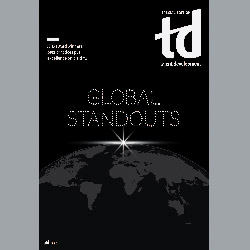TD Magazine Article
Tech Leader Focuses on Future-Proofing Employees
Cognizant has earned the most ATD awards among this year’s winners.
Mon Jul 20 2020

Cognizant has earned the most ATD awards among this year's winners.
Cognizant, a multinational IT company with more than 280,000 employees across 50 countries, has been at the forefront of helping customers navigate the shift to digital. The company's talent strategy is centered around attracting and developing people who love to learn and experiment, building skills in cutting-edge technologies, and ensuring the workforce is future ready.
The company is being recognized with four Excellence in Practice Awards in the career development, integrated talent management, and onboarding categories. Cognizant is also a 2020 BEST Award winner, the organization's fifth BEST win.
Skilling workers for emerging and future roles
Cognizant developed its Aspiring Architect Program in response to an increase in client-requested digital transformation projects, which require a strong technical team that can demonstrate thought leadership and develop innovative solutions. The available pool of software architects was limited, however, so the company developed a strategy to address the talent shortage, including creating an internal training program. In addition, the organization needed to define a learning and career path for associates who aspired to grow into software architect roles.
The L&D team consulted with internal business and technology leaders to understand the aspiring software architects' skills gaps and worked with external consultants on a technical career architecture framework. The team then developed design thinking workshops to create a program that met the company's and aspiring architects' needs.
The program concentrates on experiential and peer learning, mentoring, experience sharing, and learning application. Participants learn in virtual classrooms and through a self-paced weekly program where online assessments are used for knowledge checks. Learners also present to an expert panel to ensure they can apply concepts in a real-life scenario.
The Aspiring Architect Program is integrated within Cognizant's career growth lattice and has helped business leaders meet staffing needs by building a skilled and qualified pool of software architects who can fill current and future roles.
Another initiative that is readying employees for future roles is the Skill Transformation Framework, designed for the company's digital operations function. To understand the significant technological changes taking place in the market—including the rise of artificial intelligence, machine learning, robotics process automation, and analytics—the company reached out to existing and potential clients to determine what digital meant to each of them and what would influence their choice of a vendor partner.
An important facet of this transformation meant the reskilling and upskilling of thousands of employees in nontechnical roles spread across five continents and more than 20 countries servicing 10 different verticals. The framework enables the L&D team to build technically functional experts by augmenting the associates' domain capabilities with digital skills for future roles that would drive business impact.
The program's blended approach includes self-paced learning with mentoring support. E-learning solutions focus on the basics of emerging technologies and analytics. The company measured success in terms of the number of people who had been upskilled and deployed in roles of the future, projects that needed their newly acquired skills, or those who were now able to participate in transformation projects that clients initiated.
Results include a reduction in training cycle time, a positive impact on associates' billable rates, and an increase in revenue.
Filling onboarding needs for new hires
Another employee group with which the L&D team has directed its efforts is entry-level workers; two onboarding initiatives are showing promising results. For example, to help entry-level associates increase their knowledge, reduce errors, and become billable faster, Cognizant revamped its new-hire orientation in the healthcare claims division. An analysis of the claims transactions that newly hired claims associates completed found some errors were due to knowledge gaps.
Results from a needs analysis showed that a previous focus on the quantity of the training was a contributing factor of the knowledge gaps. Thus, the L&D team changed its focus to the quality of training content and shifted to must-know topics that new hires would use immediately. Another shift involved reinforcing learning to make it more interesting and engaging so that new hires would retain more of what they learned.
The new program the L&D team developed is a blended approach comprising four days of classroom training followed by a scenario-based e-learning program. The classroom portion includes games, role-play scenarios, knowledge checks, and videos. WhatsApp groups encourage social learning, which enhances engagement among participants. The team also makes content available as e-learning modules for participants' quick reference after the program.
The new practice helped decrease training cycle time by 50 percent (from eight days to four days, followed by e-learning). As new hires became billable four days sooner than before, during two years' time, the program had a positive impact on revenue, reduced training costs, and decreased the number of errors new hires made.
Meanwhile, Headstart GenC, which Cognizant designed for recent college graduate new hires concentrates on business assimilation, language skills, and workplace communication and behavior. The goal is to help those new to the workforce learn about the company's culture and gain experience in workplace communications via instructor-led sessions, customized language self-learning tools, and personalized coaching. In addition, the L&D team sought to replace the traditional "train-and-deploy" model the company had been using, which was longer in duration and led to higher infrastructure and training costs.
Program results—both for participants and Cognizant—are significant. The company has saved 88 learning hours per associate due to the reduction in training hours, which equates to almost 270,000 hours across all associates who participated in Headstart GenC's first year of implementation. In the program's first stage, known as the academy phase, the company has reduced associates' time in the classroom to eight days, down from 27 days in the earlier model. The blended training approaches have led to less time needed for program coordinators, which has increased trainers' productivity by 50 percent.
View the entire list of 2020 Excellence in Practice Award winners.

